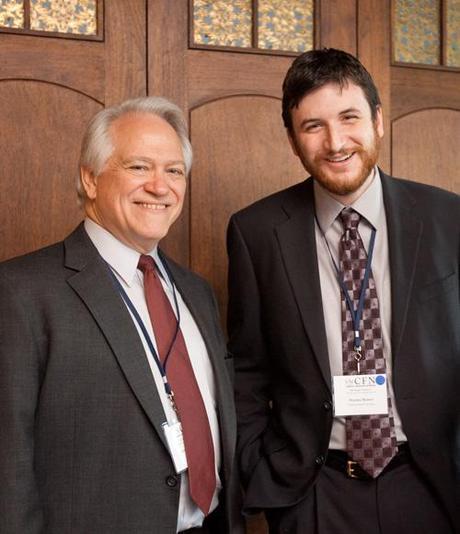
Hayden Barnes (right) and
FIRE lawyer Bob Corn-Revere
A federal jury has found that a former university president must pay $50,000 in damages for wrongfully expelling a student who had protested the construction of two parking garages on campus.
The verdict, in a case styled Barnes v. Zaccari, is being hailed as a major victory for supporters of free speech in higher education. Ronald M. Zaccari, former president of Valdosta State University in Georgia, was held personally liable for damages to former student Hayden Barnes, who was "administratively withdrawn" from the university after peacefully protesting a decision to build parking garages. The Foundation for Individual Rights in Education (FIRE), and attorney Bob Corn-Revere, took the case on Barnes' behalf.
Barnes has a number of parallels to my own experiences at the University of Alabama at Birmingham (UAB), where former president Carol Garrison OK'd my unlawful termination after almost 20 years on the job in various editorial positions. We have presented irrefutable evidence, in the form of a tape-recorded conversation with a UAB human-resources official, that I was targeted because of my reporting on this blog about the Bush-era political prosecution of former Alabama Governor Don Siegelman.
In my case, an employee grievance committee found that I should not have been terminated, and evidence at the hearing showed my supervisor had no grounds for even minimal discipline, much less immediate termination. Cheryl E.H. Locke, UAB's HR director at the time, upheld my termination when I refused her offer to return to a position other than the one I had before--in an unnamed department, under an unknown supervisor--with two written warnings in my file. (A UAB employee automatically is fired for a third written warning; this strongly suggests that the university was setting me up to be fired all over again, after it had botched the job on its first try.)
I appealed Locke's ruling to Garrison, but the university president went against her own grievance committee--which spent four hours hearing evidence--and upheld my termination.
The ruling in Barnes drives home the point that Garrison could be held personally responsible for depriving me of a clear constitutional right--in this case, the First Amendment right to free speech. And the damages would amount to way more than $50,000.
Of course, a corrupt federal judge named William M. Acker Jr. granted summary judgment to the university and individual defendants in my case, even though I was given no opportunity to conduct discovery. Basic procedural law, perhaps best outlined in a case styled Snook v. Trust Company of Georgia, 859 F. 2d 865 (11th Cir., 1988), plainly states that summary judgment cannot be granted, much less considered, when the opposing party has not been given adequate opportunity to conduct discovery.
I was given no opportunity to conduct discovery, but Acker happily violated black-letter law to let Garrison and others off the hook. The good news, from my perspective, is that the case was dismissed without prejudice, meaning it can be brought again.
Barnes, at first glance, is not ground-breaking law. University officials and other "state actors" long have been subject to liability for violations of clear constitutional rights. The issue in Barnes was this: Did his enrollment at Valdosta State amount to a property right that could not be abridged without due process? In other words, did Barnes have a clear constitutional right to not be unlawfully expelled?
In 2010, the U.S. Eleventh Circuit Court of Appeals in Atlanta answered that question in the affirmative, essentially stating that sovereign immunity did not protect the university president. That led to a trial and last week's $50,000 judgment against Zaccari.
Ironically, neither Zaccari nor Garrison remains in office. Zaccari was forced to resign under pressure after the Barnes lawsuit was filed. Garrison suffered a similar fate at UAB, when she stepped down under mysterious circumstances last August, just two days after fall classes started.
Why has Hayden Barnes received a significant measure of justice in his campus free-speech case, while I (so far) have been cheated on a much stronger case? As I see it, here is the major difference: Barnes had the good fortune to have the Foundation for Individual Rights in Education (FIRE) take up his case. I, on the other hand, have been representing myself--acting pro se, as it's called in the legal world.
A corrupt federal judge, such as William Acker Jr., has little reason to fear cheating a pro se litigant. But cheating a party who is represented by a national organization such as FIRE is a good way to draw attention to yourself. And that's the last thing a corrupt federal judge wants.
In fact, FIRE noted that campus free-speech cases can be exceptionally difficult to win without the backing of a powerful organization. From a FIRE press release:
"College administrators have been blatantly and willfully violating student rights for decades, but they have far too often dodged personal responsibility. Not so today," said FIRE President Greg Lukianoff. "We hope this serves as a much-needed wake up call to college administrators that it's time to start paying close attention to the basic rights of their students."
I applaud FIRE's efforts on behalf of Hayden Barnes. But I would suggest the organization take a closer look at constitutional violations against university employees.
I know, from first-hand experience, that they occur all too frequently.
